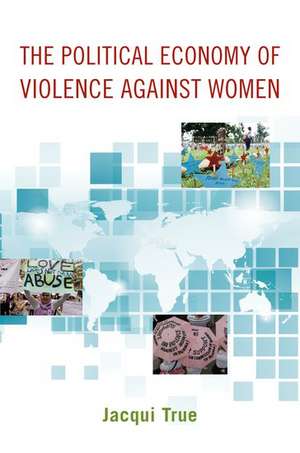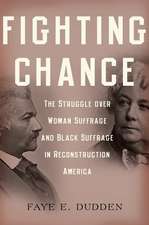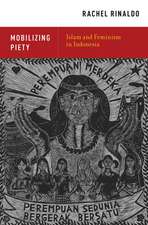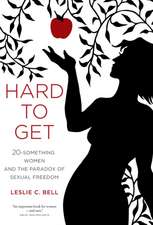The Political Economy of Violence against Women: Oxford Studies in Gender and International Relations
Autor Jacqui Trueen Limba Engleză Paperback – 6 sep 2012
Din seria Oxford Studies in Gender and International Relations
- 27%
 Preț: 370.37 lei
Preț: 370.37 lei - 23%
 Preț: 453.86 lei
Preț: 453.86 lei - 19%
 Preț: 617.59 lei
Preț: 617.59 lei - 14%
 Preț: 199.10 lei
Preț: 199.10 lei - 24%
 Preț: 370.87 lei
Preț: 370.87 lei - 27%
 Preț: 426.14 lei
Preț: 426.14 lei - 7%
 Preț: 216.34 lei
Preț: 216.34 lei - 16%
 Preț: 491.33 lei
Preț: 491.33 lei -
 Preț: 235.79 lei
Preț: 235.79 lei - 19%
 Preț: 127.24 lei
Preț: 127.24 lei - 19%
 Preț: 177.77 lei
Preț: 177.77 lei -
 Preț: 258.50 lei
Preț: 258.50 lei - 10%
 Preț: 439.09 lei
Preț: 439.09 lei - 9%
 Preț: 480.59 lei
Preț: 480.59 lei - 18%
 Preț: 345.75 lei
Preț: 345.75 lei - 13%
 Preț: 135.12 lei
Preț: 135.12 lei - 27%
 Preț: 402.03 lei
Preț: 402.03 lei - 15%
 Preț: 277.35 lei
Preț: 277.35 lei - 19%
 Preț: 198.22 lei
Preț: 198.22 lei -
 Preț: 287.11 lei
Preț: 287.11 lei - 14%
 Preț: 278.91 lei
Preț: 278.91 lei - 12%
 Preț: 215.78 lei
Preț: 215.78 lei - 26%
 Preț: 582.53 lei
Preț: 582.53 lei - 14%
 Preț: 177.77 lei
Preț: 177.77 lei - 20%
 Preț: 279.41 lei
Preț: 279.41 lei - 30%
 Preț: 612.43 lei
Preț: 612.43 lei - 23%
 Preț: 183.17 lei
Preț: 183.17 lei - 30%
 Preț: 492.40 lei
Preț: 492.40 lei - 11%
 Preț: 222.30 lei
Preț: 222.30 lei - 18%
 Preț: 225.04 lei
Preț: 225.04 lei - 30%
 Preț: 552.22 lei
Preț: 552.22 lei - 30%
 Preț: 494.84 lei
Preț: 494.84 lei - 30%
 Preț: 491.59 lei
Preț: 491.59 lei - 30%
 Preț: 581.39 lei
Preț: 581.39 lei - 30%
 Preț: 521.67 lei
Preț: 521.67 lei - 23%
 Preț: 163.62 lei
Preț: 163.62 lei - 30%
 Preț: 548.28 lei
Preț: 548.28 lei - 11%
 Preț: 400.01 lei
Preț: 400.01 lei
Preț: 265.32 lei
Nou
Puncte Express: 398
Preț estimativ în valută:
50.77€ • 53.15$ • 42.01£
50.77€ • 53.15$ • 42.01£
Carte tipărită la comandă
Livrare economică 25-31 martie
Preluare comenzi: 021 569.72.76
Specificații
ISBN-13: 9780199755912
ISBN-10: 0199755914
Pagini: 256
Ilustrații: black & white illustrations
Dimensiuni: 231 x 155 x 18 mm
Greutate: 0.34 kg
Editura: Oxford University Press
Colecția OUP USA
Seria Oxford Studies in Gender and International Relations
Locul publicării:New York, United States
ISBN-10: 0199755914
Pagini: 256
Ilustrații: black & white illustrations
Dimensiuni: 231 x 155 x 18 mm
Greutate: 0.34 kg
Editura: Oxford University Press
Colecția OUP USA
Seria Oxford Studies in Gender and International Relations
Locul publicării:New York, United States
Recenzii
By bringing the political economy approach to her analysis, Jacqui True has rightfully placed 'violence against women' within the web of economic, social and political realms, demonstrating that the problem is embedded in structured inequalities in relations of production and reproduction. She demystifies the often compartmentalized approaches that reduce the problem to 'victimization' and 'harm done' and reveals how gendered social and economic inequalities increase the risks of violence against women whether in the context of different hierarchical systems, neoliberal economic policies, armed conflicts, natural disasters or other crises. This book is a major contribution to the feminist debates on women's human rights and will have a positive impact on policy and practice for change.
I have been working in the field of human rights and in particular the rights of women for many, many years. My own observations, particularly in relation to post-conflict situations, were that the absence of social and economic rights inhibited real participation by women in governance and other public life. Jacqui True has explained that simplistic observation as only part of a broader analysis. She moves easily from one context to the next, from the economic crisis to trafficking, between conflict and non-conflict, and consistently explains and applies the theory of political economy in a way which is compelling. With this book she has opened a door, and one which we should all be determined to go through.
I have been working in the field of human rights and in particular the rights of women for many, many years. My own observations, particularly in relation to post-conflict situations, were that the absence of social and economic rights inhibited real participation by women in governance and other public life. Jacqui True has explained that simplistic observation as only part of a broader analysis. She moves easily from one context to the next, from the economic crisis to trafficking, between conflict and non-conflict, and consistently explains and applies the theory of political economy in a way which is compelling. With this book she has opened a door, and one which we should all be determined to go through.
Notă biografică
Jacqui True is Professor of Politics and international Relations at Monash University










